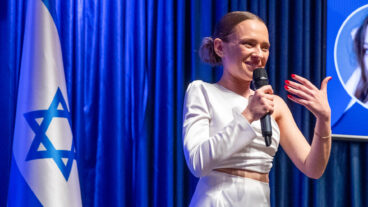Eli Alifant, Rona Gotlieb, and Naftali Aklom (from left) are some of the Israel At Heart participants who will be spreading across the U.S. to describe their lives in Israel.Naftali Aklom was less than a year old when his parents decided to move his family from Ethiopia to Israel. But the 24-year-old tells of the adventure – which he has heard from his parents numerous times – as if it happened yesterday.
He tells of the long hard walk from Ethiopia via Sudan to Israel in 1979, in which one of his brothers died on the way. And he smiles broadly when he gets to the part in the tale where his family, finally makes it to Israel and set up life in Beersheba.
Aklom’s story as well as 44 other personal accounts of day-to-day life in Israel will be told by participants during next month’s “Israel At Heart” program, an innovative initiative which brings young Israelis to the U.S. to talk about their lives beyond what’s seen in the media.
“This is the place my family dreamed of coming for 2,000 years,” says Aklom. “I love Israel.”
Aklom, who now works as a security guard and is saving up to study, will head to Florida and New Orleans to tell Americans his story and his love for his adopted country. The dreadlocked young man wearing a fashionable Hot Tuna T-shirt says that he’s traveled abroad extensively, yet can’t think of anywhere he’d rather live than Israel.
“I love living here. What you see on the TV screen isn’t always the truth,” he says. “I don’t want people to lose hope for peace here. This is my home.”
The fresh and innovative program was initiated two years ago by New York businessman Joey Low, who found himself distressed by Israel’s deteriorating image among teens and 20-somethings in the United States, even within the Jewish community. This year he’s expanding the outreach efforts to include Europe as well.
“I thought, ‘let them hear from Israeli kids what life is like, what the army is like’ – no politics, just life stories,” Low told ISRAEL21c last week during a training seminar in Israel.
One glimpse at the “Israel At Heart” participants – a mix of ethnic backgrounds; secular and religious; some sporting long hair, others shaved heads; Some with tattoos and others with piercings; All of them good-looking – the first thought that comes to mind when looking at the group is that young Israelis are cool.
The 45 lucky ambassadors were chosen from a pool of more than 200 students who applied. They all speak fluent English and have completed army service. The young Israelis will visit college campuses, city councilmen, churches, black leaders, Jewish day schools, and centers for the Russian Jewish community.
To prepare for the November 2-16 tour, the students, ranging in age from 22 to 28 attended a two-day seminar in October where experts debriefed them on questions they can expect from different audiences. Gideon Meir, the Foreign Ministry’s deputy director-general for public affairs, led one of the seminars. He touched on the Europeans’ general attitude towards Israel and gave tips on how to talk. Although avoiding political questions will be impossible, the ambassadors’ goal is to shed new light onto who Israelis really are.
Adir Gal is a second-time participant. He hopes to convince his Dutch and Belgian peer group that Israelis are not the callous military men that European news media outlets portray them to be. “This is my chance to do something for the country because it’s portrayed really badly in the media. People abroad think it’s a battle zone
here. this is an opportunity to bring them something different, to see the Israelis themselves,” says Gal, a 26-year-old student of Government Strategies and Diplomacy.
After five and a half years in the army, Gal – like many Israelis – went travelling for a year to Southeast Asia, Europe and Australia. “The people I met didn’t know the right stuff about Israel. I felt I was bringing them something new. Israel as it is,” he says.
Ellie Elifant, a third time “Israel At Heart”
participant, says many young Americans believe
everything they see on the news. “But I am a soldier and I don’t kill three-year-old children. I try to get people to question what they’re really seeing on CNN and other similar programs,” he says.
Iyar Semel was on the first “Israel At Heart” mission to the US. “I felt one of the things Israel needs most abroad is good public relations. Israel’s PR in the US
and Europe is so poorly portrayed, that my
participation in this project was my way of giving back to the country that gave me so much.”
Semel spoke to communities in Washington DC, Maryland and New York. “I brought Israel a bit closer to people who have no idea what Israel is about. They watch TV and that’s their way of seeing things. The media is not the right way to see things,” says Semel, who at
night deejays at clubs in Tel Aviv.
Looking at Gal, Elifant and Semel in person, one
doesn’t think Rambo. Instead, Gal – with his long
curly hair, trendy but casual clothes, and an African symbol tattoo on his shoulder – and Semel – with his dreadlocks and lower-lip ring – exude their party-planner/deejay personas respectively. Elifant, who speaks in a soft voice and is dressed coolly but casually, resembles the mould of the part-time job he
holds as a computer technician.
“Israel is such a small country and there are so many terror attacks that you can’t avoid them,” says Gal. “But we’re still trying to manage a normal life – go to the beach, cafes, and bars. I try to connect it to 9-11, I tell my American peers ‘you suffered from terrorism also, but you don’t stay at home, you go out, you have a normal life.’ Terrorism is worldwide now.
We have to maintain a normal life to beat terrorism. This is the point I try to make. Most of the people [I spoke to] were surprised that Israelis go out and party all night. They hear about explosions and they think the whole country is a war zone.”
“Tel Aviv is a cool city,” adds Elifant, 26. “Everyone lives for the day. Young people here are full of energy. It’s a very friendly country.”
Semel, a 24-year-old aspiring music student, was happy to tap his American peers into “what is cool about Israel.”
“I’m very happy to be an Israeli. I lived in the US for three-and-a-half years so I do feel like I have perspective,” says Semel, whose father was the cultural attaché at the consulate in New York at the beginning of the ’90s. “Israel has a lot of special things. There’s a certain vibration here with people that you don’t have anywhere else. Outdoor nature trance parties are very Israeli. This landscape, under the trees, on the land, the beach, the music… Just
by the picture you know it’s Israeli.”
The participants have said they will try and stay away from talking politics. And Low, their sponsor, wouldn’t have it any other way. For Low, who helped found Israel’s Peace Now, the main focus of the program is not whether someone is on the ‘right’ or ‘left’. Rather, his sponsorship results from his “love for Israel.”












